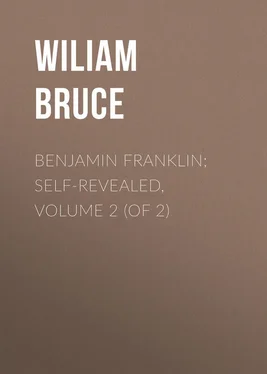Wiliam Bruce - Benjamin Franklin; Self-Revealed, Volume 2 (of 2)
Здесь есть возможность читать онлайн «Wiliam Bruce - Benjamin Franklin; Self-Revealed, Volume 2 (of 2)» — ознакомительный отрывок электронной книги совершенно бесплатно, а после прочтения отрывка купить полную версию. В некоторых случаях можно слушать аудио, скачать через торрент в формате fb2 и присутствует краткое содержание. Жанр: foreign_antique, foreign_prose, на английском языке. Описание произведения, (предисловие) а так же отзывы посетителей доступны на портале библиотеки ЛибКат.
- Название:Benjamin Franklin; Self-Revealed, Volume 2 (of 2)
- Автор:
- Жанр:
- Год:неизвестен
- ISBN:нет данных
- Рейтинг книги:4 / 5. Голосов: 1
-
Избранное:Добавить в избранное
- Отзывы:
-
Ваша оценка:
- 80
- 1
- 2
- 3
- 4
- 5
Benjamin Franklin; Self-Revealed, Volume 2 (of 2): краткое содержание, описание и аннотация
Предлагаем к чтению аннотацию, описание, краткое содержание или предисловие (зависит от того, что написал сам автор книги «Benjamin Franklin; Self-Revealed, Volume 2 (of 2)»). Если вы не нашли необходимую информацию о книге — напишите в комментариях, мы постараемся отыскать её.
Benjamin Franklin; Self-Revealed, Volume 2 (of 2) — читать онлайн ознакомительный отрывок
Ниже представлен текст книги, разбитый по страницам. Система сохранения места последней прочитанной страницы, позволяет с удобством читать онлайн бесплатно книгу «Benjamin Franklin; Self-Revealed, Volume 2 (of 2)», без необходимости каждый раз заново искать на чём Вы остановились. Поставьте закладку, и сможете в любой момент перейти на страницу, на которой закончили чтение.
Интервал:
Закладка:
The office of Clerk of the Assembly also had its business value.
Besides the pay for the immediate service as clerk [Franklin says] the place gave me a better opportunity of keeping up an interest among the members, which secur'd to me the business of printing the votes, laws, paper money, and other occasional jobbs for the public, that, on the whole, were very profitable.
The first year that he came up for election the vote in his favor was unanimous, but the next year, while he was elected, it was only after a new member had made a long speech against him in the interest of another candidate. How Franklin conciliated the unfriendliness of this member is fully told in the Autobiography ;
I therefore did not like the opposition of this new member, who was a gentleman of fortune and education, with talents that were likely to give him, in time, great influence in the House, which, indeed, afterwards happened. I did not, however, aim at gaining his favour by paying any servile respect to him, but, after some time, took this other method. Having heard that he had in his library a certain very scarce and curious book, I wrote a note to him, expressing my desire of perusing that book, and requesting he would do me the favour of lending it to me for a few days. He sent it immediately, and I return'd it in about a week with another note, expressing strongly my sense of the favour. When we next met in the House, he spoke to me (which he had never done before), and with great civility; and he ever after manifested a readiness to serve me on all occasions, so that we became great friends, and our friendship continued to his death. This is another instance of the truth of an old maxim I had learned, which says, " He that has once done you a kindness will be more ready to do you another, than he whom you yourself have obliged. " And it shows how much more profitable it is prudently to remove, than to resent, return, and continue inimical proceedings.
The artifice practised by Franklin on this occasion has been condemned. What he really did, of course, was to use gratified vanity as a foil to mortified vanity. The possible consequences of the new member's hostility were too serious for him to say as Washington was in the habit of saying when he had a bad cold: "Let it go as it came." He knew that the malice was as shallow as the good will; and the alternatives were resentment, sycophancy, or a little subtlety. Under the circumstances, Franklin would not have been Franklin, if he had not elected subtlety.
Nothing was now wanting to the full development of his business career except the repetition in other communities of the success that had crowned his personal exertions in Pennsylvania. Referring to the state of his business at this time, he says in the Autobiography ;
My business was now continually augmenting, and my circumstances growing daily easier, my newspaper having become very profitable, as being for a time almost the only one in this and the neighboring provinces. I experienced, too, the truth of the observation, " that after getting the first hundred pound, it is more easy to get the second ," money itself being of a prolific nature.
The outcome of it all was that, in the year 1748, at the age of forty-two, he flattered himself, to repeat his own language, that, by the sufficient, though moderate, fortune which he had acquired, he had secured leisure during the rest of his life for philosophical studies and amusements.
The plan that he formed for securing this leisure, which he turned to such fruitful, purposes, was marked by his usual good judgment. In 1744, he had taken into his employment David Hall, a Scotch journeyman, and a friend of Strahan. He now admitted Hall to partnership with him. "A very able, industrious, and honest partner, Mr. David Hall, with whose character I was well acquainted, as he had work'd for me for four years," are the terms in which he speaks of Hall in the Autobiography . "He took off my hands," he continues, "all care of the printing-office, paying me punctually my share of the profits. The partnership continued eighteen years, successfully for us both." Under the provisions of the partnership agreement, Hall was to carry on the printing and publishing business of Franklin in his own way, but in the firm name of Franklin and Hall, and Hall was to pay to Franklin a thousand pounds a year for eighteen years; at the end of which period Hall was to become the sole proprietor of the business. 9Exactly what income Franklin was deriving from his printing and publishing business at the time that this agreement was entered into is not known, but reasonable conjecture has placed it at something like two thousand pounds a year. At that time he was also the owner of a considerable amount of property, representing invested returns from his business in the past. The Gazette continued to be published until the year 1821. When the term of eighteen years, during which the partnership was to last, expired in 1766, the profits had been over twelve thousand pounds, Pennsylvania currency, from subscriptions, and over four thousand pounds, Pennsylvania currency, from advertisements. Judged by the standards of the time and place, it was an extraordinary degree of success which had enabled Franklin in some twenty years to establish so lucrative a business as that which he handed over to the management of Hall in 1748, and few indeed have been the men in mercantile history, who have been willing, after so long a period of prosperous addiction to gain, to turn away to purely intellectual and unremunerative pursuits from such a prospect of increasing self-enrichment as that renounced by Franklin when he wrote to Cadwallader Colden that he, too, was taking the proper measures for obtaining leisure to enjoy life and his friends more than in the past; having put his printing-house under the care of his partner, David Hall, absolutely left off book-selling, and removed to a more quiet part of the town, where he was settling his old accounts, and hoped soon to be quite master of his own time, and no longer, as the song had it, at everyone's call but his own. Nobody knew better than he that, if, after getting the first hundred pounds, it is easier to get the second, it is still easier, after getting the second hundred pounds, to get the third.
For Hall, Franklin entertained uninterrupted feelings of respect and affection, down to the date of the former's death on December 17, 1772. "My Love to Mr. Hall," is one of his messages to Deborah some seven years after the firm of Franklin and Hall was created. Before that he had written to Strahan, "Our friend, Mr. Hall, is well, and manages perfectly to my satisfaction." Many years after the death of Hall, the account between Franklin and him had not been wholly settled, and a letter from the former to Strahan in the year 1785 tells him that Hall and himself had not been of the same mind as to "the value of a copyright in an established newspaper, of each of which from eight to ten thousand were printed," but "were to be determined" by Strahan's opinion. "My long absence from that country, and immense employment the little time I was there," Franklin wrote, "have hitherto prevented the settlement of all the accounts that had been between us; though we never differed about them, and never should if that good honest man had continued in being."
Franklin's failure to forecast the stubborn hostility of the Colonies to the Stamp Act not only cost him some personal popularity but it caused his firm some pecuniary loss. Anticipating with his usual shrewdness the passage of that Act, which imposed a tax of a sterling half-penny on every half-sheet of a newspaper, however small, he sent over to Hall one hundred reams of large half-sheet paper, but permission could not be obtained to have it stamped in America, and it was all reshipped to England at a loss.
Читать дальшеИнтервал:
Закладка:
Похожие книги на «Benjamin Franklin; Self-Revealed, Volume 2 (of 2)»
Представляем Вашему вниманию похожие книги на «Benjamin Franklin; Self-Revealed, Volume 2 (of 2)» списком для выбора. Мы отобрали схожую по названию и смыслу литературу в надежде предоставить читателям больше вариантов отыскать новые, интересные, ещё непрочитанные произведения.
Обсуждение, отзывы о книге «Benjamin Franklin; Self-Revealed, Volume 2 (of 2)» и просто собственные мнения читателей. Оставьте ваши комментарии, напишите, что Вы думаете о произведении, его смысле или главных героях. Укажите что конкретно понравилось, а что нет, и почему Вы так считаете.










![Benjamin Franklin - Memoirs of Benjamin Franklin; Written by Himself. [Vol. 2 of 2]](/books/747975/benjamin-franklin-memoirs-of-benjamin-franklin-wr-thumb.webp)
![Benjamin Franklin - Memoirs of Benjamin Franklin; Written by Himself. [Vol. 1 of 2]](/books/748053/benjamin-franklin-memoirs-of-benjamin-franklin-wr-thumb.webp)
